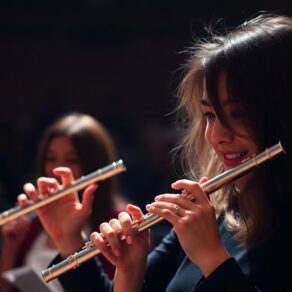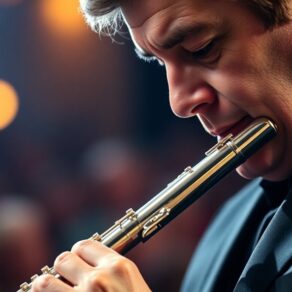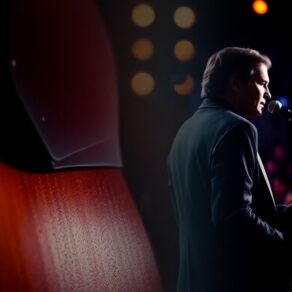Julius Baker's legacy as America's great flute teacher has profoundly shaped music education. You'll find he emphasized a holistic approach, focusing not just on technique but on fostering creativity and a growth mindset. His innovative methods, particularly in breath control and finger technique, transformed flute pedagogy and inspired countless students, including renowned flutists like James Galway. Baker's teachings encouraged an environment where mistakes became opportunities for growth. His influence extends beyond individual instruction, impacting the broader music community and fostering collaboration. To truly grasp the depth of his impact, you'll uncover the ongoing relevance of his principles in modern flute playing.
Key Takeaways
- Julius Baker revolutionized flute pedagogy by emphasizing breath control and finger technique, enhancing both tone quality and emotional expression in performances.
- His holistic teaching methodology focused on individual strengths, fostering a growth mindset and viewing mistakes as essential learning opportunities.
- Baker mentored notable flutists, including James Galway, who went on to achieve success in prestigious orchestras and music institutions.
- He received multiple accolades, such as the National Flute Association Lifetime Achievement Award, solidifying his influence in music education.
- Baker's legacy continues to inspire flutists and educators, promoting collaboration and the establishment of flute competitions and teaching workshops.
Early Life and Education
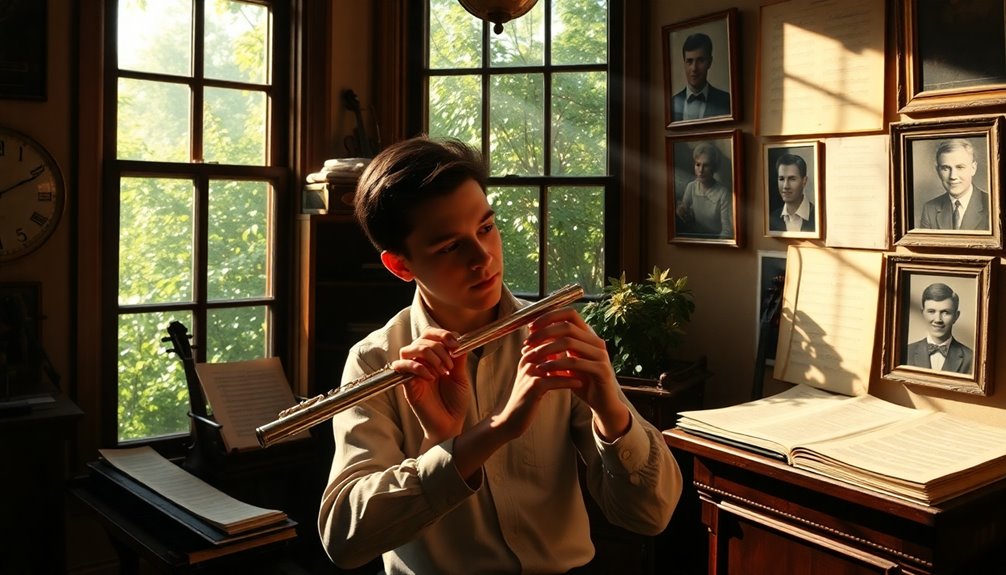
Although Julius Baker's legacy is often celebrated for his remarkable contributions to the world of music and education, his early life and education laid the groundwork for his future success. Born into a family with a rich cultural heritage, Baker's family background played an essential role in shaping his musical identity. Growing up in a household that embraced the arts, he was immersed in a world of creativity from a young age, which ignited his passion for music.
Baker's musical influences were diverse and profound. His exposure to various genres and styles helped him develop a well-rounded appreciation for the art form. You can see how this eclectic mix of influences informed his teaching and performance techniques later in life. He didn't just limit himself to classical music; he explored folk, jazz, and contemporary styles, allowing him to connect with a broader audience. This adaptability became a hallmark of his teaching philosophy. Additionally, his commitment to varied learning methods reflected his belief in engaging students through practical exercises and theory, fostering a more comprehensive understanding of music.
As he navigated his formative years, Baker's dedication to his craft was evident. He sought out mentors who could guide him, understanding the importance of learning from those who'd walked the path before him. Each lesson learned, whether from a teacher or through personal experience, contributed to his evolving identity as a musician.
Teaching Philosophy
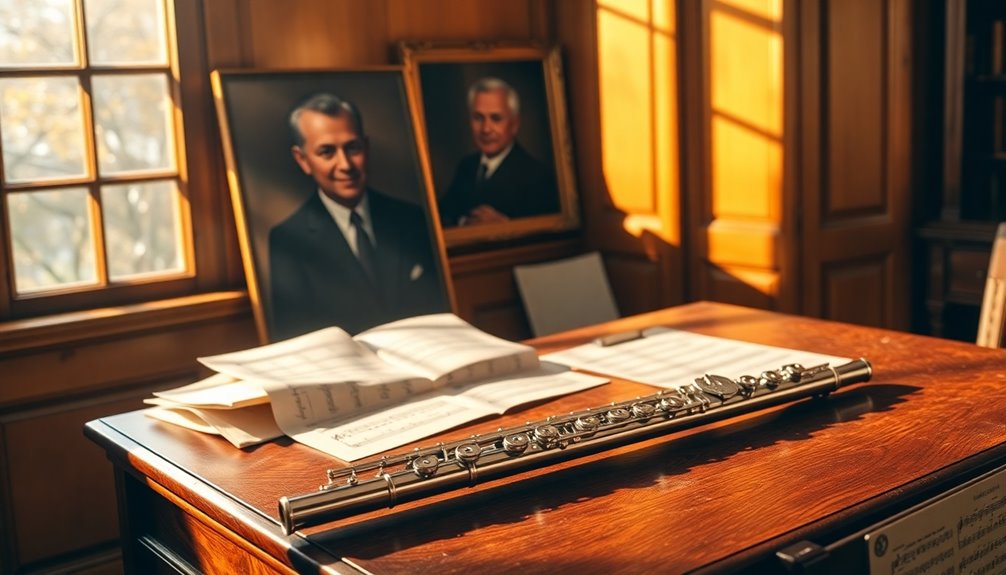
Julius Baker's extensive experiences and rich musical influences naturally shaped his teaching philosophy, which became a cornerstone of his legacy. At the heart of his approach was the belief in a holistic methodology. He recognized that a musician's development transcends mere technical proficiency; it involves nurturing emotional, intellectual, and expressive dimensions. By fostering this all-encompassing growth, you, as a student, are empowered to connect more deeply with your instrument and your audience.
Baker emphasized the importance of individualized instruction. He understood that each student has unique strengths and challenges, and he tailored his lessons accordingly. This personalization not only cultivated a sense of belonging but also inspired confidence in your abilities. When you felt valued as an individual, you were more likely to take risks and explore your own musical identity.
In his teaching, Baker encouraged a growth mindset. He believed that mistakes were opportunities for learning rather than failures. This perspective empowered you to embrace challenges and develop resilience. He cultivated an environment where curiosity and experimentation were celebrated, allowing you to discover your own artistic voice. His commitment to mastering advanced techniques ensured that students not only developed their skills but also expanded their artistic possibilities.
Ultimately, Julius Baker's teaching philosophy was about more than just flute playing; it was about fostering a community of passionate musicians. By embracing a holistic approach and emphasizing student empowerment, he created a legacy that continues to resonate with aspiring flutists today. You're not just learning an instrument; you're becoming part of a vibrant musical family, united by a shared love for the art.
Notable Students
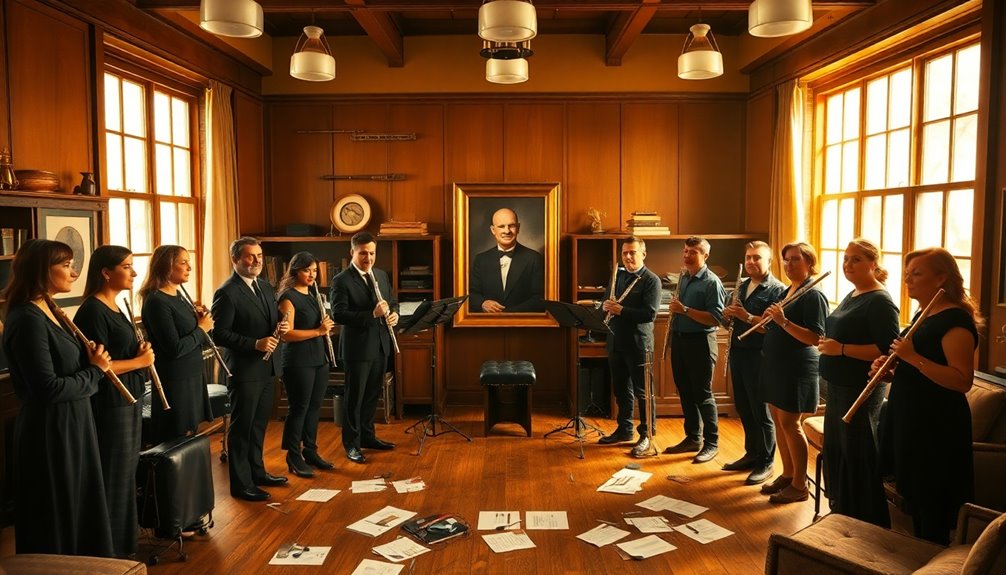
Many accomplished musicians credit their success to the profound influence of Julius Baker as a mentor. His famous alumni include renowned flutists like James Galway, who not only exemplified technical prowess but also brought the flute into the spotlight of popular music. Under Baker's guidance, students learned to blend artistry with skill, fostering an environment where their individual achievements could flourish.
Baker's teaching methods encouraged students to explore their unique voices while mastering the intricacies of flute performance. He emphasized the importance of sound production, musical interpretation, and emotional expression, leading to a generation of flutists who became leaders in their field. Many of his students achieved remarkable milestones, securing positions in prestigious orchestras and teaching at esteemed music institutions worldwide.
The impact of Baker's mentorship extends beyond technical skills. His students often speak of the sense of community and belonging he cultivated. They found a space where they could share ideas, collaborate, and inspire one another, creating bonds that lasted long after their studies ended.
This network of support among Baker's famous alumni has continued to thrive, promoting a legacy of excellence and camaraderie. As you consider your own journey in music, remember the pathways carved by these notable students. Their achievements serve as a demonstration of the transformative power of mentorship, illustrating that with dedication and guidance, your aspirations can become reality.
Additionally, many of Baker's students have gone on to recommend the best student flutes(#) to aspiring flutists, ensuring that new generations have access to quality instruments that support their growth.
Embrace the spirit of Julius Baker, and let it propel you toward your own success.
Innovative Techniques
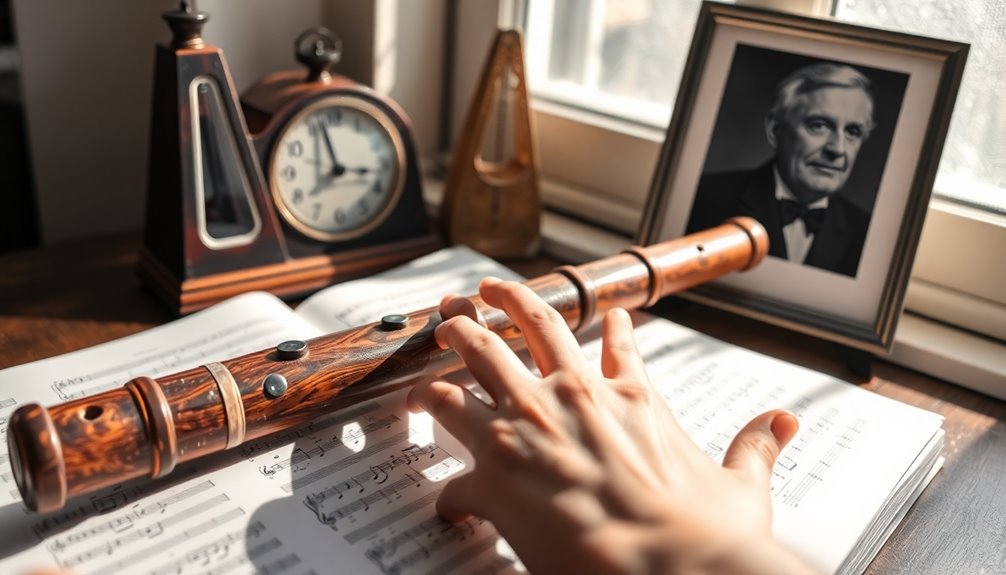
Building on the strong foundation set by his notable students, Baker's innovative techniques revolutionized flute pedagogy. He understood that mastering the flute goes beyond mere technical skills; it requires a deep connection between the musician and their instrument. With this in mind, he implemented unique methods that focused on breath control and finger technique, allowing students to express their individuality.
One of his key insights was that effective breath control directly influences tone quality and dynamics. He encouraged you to explore the full capacity of your breath, teaching you to harness it not just for volume, but for emotional expression. This approach empowers you to create a sound that resonates with both the performer and the listener, fostering a sense of shared experience. Additionally, he emphasized the significance of diaphragmatic breathing in achieving optimal air control, which further enhances tone quality and musical expression.
In terms of finger technique, Baker emphasized the importance of fluidity and precision. He developed exercises that promoted agility, ensuring your fingers could move effortlessly across the keys. By integrating these exercises into your daily practice, you learn to trust your physical capabilities, enhancing your overall performance.
Baker's techniques weren't just about playing notes; they were about cultivating a musician's identity. His philosophy invites you to embrace your uniqueness while pursuing excellence. By blending breath control with refined finger technique, you become part of a legacy that champions not just skill, but artistry.
With Baker's guidance, you'll find a place in the rich tapestry of flute music, where your voice matters and your journey is celebrated.
Contributions to Flute Pedagogy
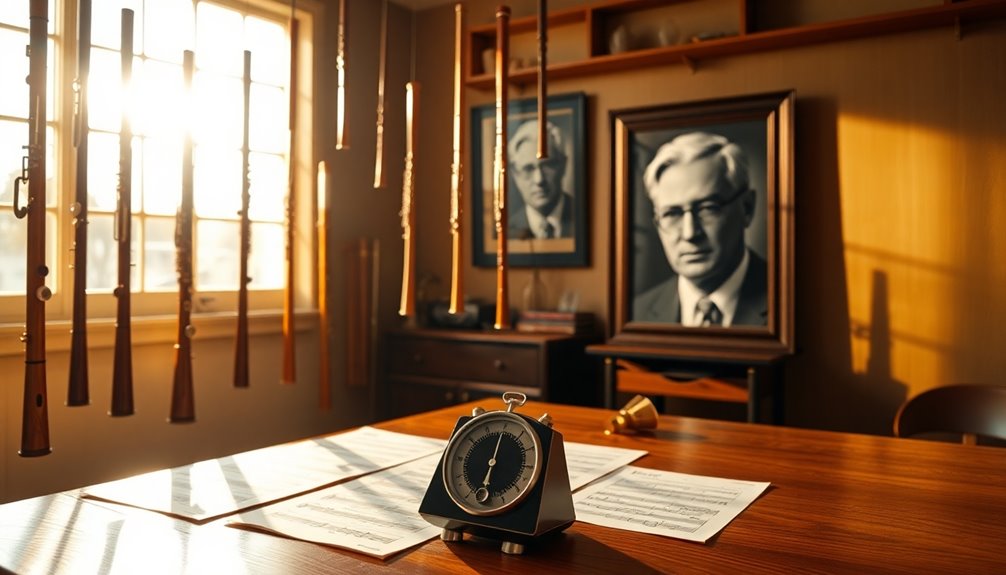
It could be contended that the true essence of flute pedagogy was forever changed by Baker's profound contributions. His innovative approach transformed how you reflect on teaching and learning the flute. By emphasizing the importance of solid foundational techniques, Baker offered a framework that many educators still rely on today. He understood that mastery starts with consistent practice, and he championed specific flute exercises that not only developed technical skills but also nurtured musicality.
You might find it inspiring to contemplate the following key elements of Baker's pedagogy methods:
- Holistic Development: Baker believed in nurturing the whole musician. He encouraged students to engage with various musical styles and genres, fostering adaptability and creativity.
- Structured Practice Regimens: He devised detailed practice routines that included targeted flute exercises. These routines focused on tone production, breath control, and finger agility, which are essential for any aspiring flutist.
- Individualized Instruction: Recognizing that each student is unique, Baker tailored his teaching methods to fit individual needs. He emphasized the importance of personal expression and encouraged students to find their own voice on the instrument.
Through these contributions, Baker not only enhanced flute education but also created a sense of community among his students. His legacy continues to motivate flutists to pursue excellence with purpose and passion, reminding you that learning is a journey best shared. Incorporating techniques such as airflow control can further enhance a student's ability to produce a rich and expressive sound on the flute.
Influence on Music Education
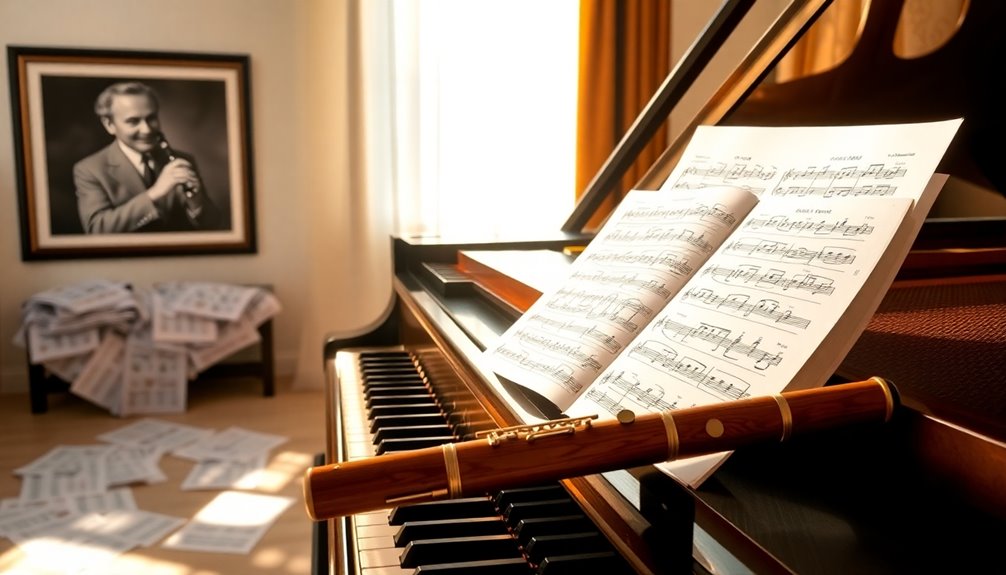
The impact of Julius Baker on music education extends far beyond the domain of flute pedagogy, shaping how educators approach teaching across various instruments and disciplines. His emphasis on high performance standards set a benchmark that many music programs aim to achieve today. By prioritizing technique, expression, and musical understanding, Baker encouraged a holistic approach to music education that resonates in classrooms and studios around the world.
You'll find that Baker's influence is evident in modern teaching methodologies as well. He advocated for tailored instruction, recognizing that each student has unique strengths and challenges. This personalized approach not only fosters individual growth but also cultivates a sense of belonging among students. When you create an environment where students feel valued, you empower them to embrace their musical journey fully.
Moreover, Baker's commitment to fostering creativity opened doors for innovative teaching strategies. He inspired educators to integrate various styles and genres into their curriculum, enriching the learning experience. By breaking down traditional barriers, you can create a more inclusive space that invites collaboration and exploration. His approach aligns with the importance of diverse repertoire in developing a well-rounded musical education.
As you explore Baker's legacy, remember that his teachings encourage you to not just impart knowledge but also to inspire passion for music. Aspiring for excellence in performance standards while embracing diverse teaching methodologies lays the foundation for a vibrant music education community.
Ultimately, by embodying these principles, you contribute to a legacy that transcends generations, forging connections through the universal language of music.
Awards and Recognitions
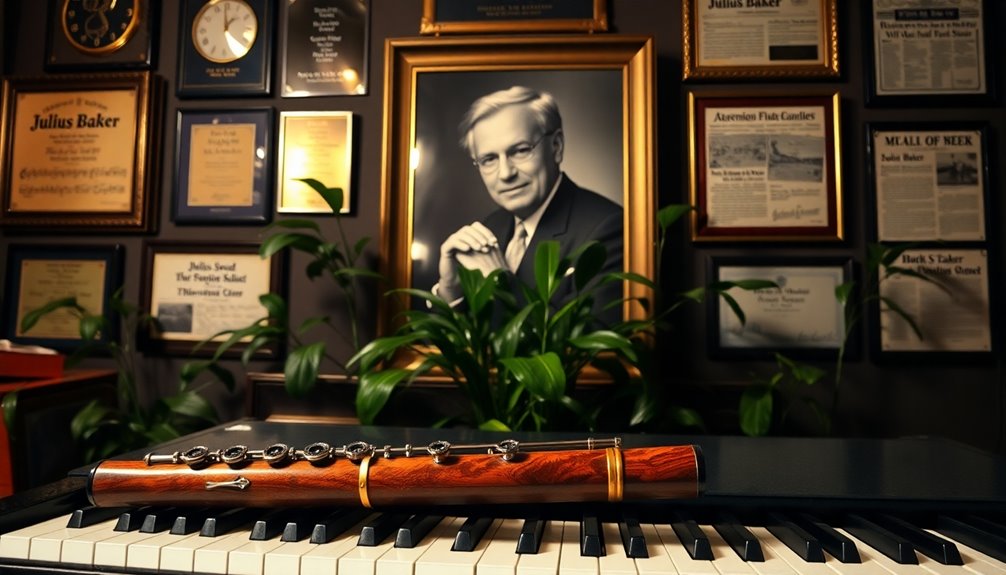
Julius Baker's profound contributions to music education haven't gone unrecognized; his accolades reflect not only his exceptional talent but also his transformative influence on the field.
His journey as a flutist and educator is marked by numerous awards and honors that underscore his impact on students and the broader music community. You can find inspiration in his achievements, which remind us of the potential within each of us to create change through dedication and passion.
Baker received various performance accolades that highlighted his prowess as a flutist. These achievements not only elevated his status but also established him as a role model for aspiring musicians.
Additionally, his teaching honors are a reflection of the deep respect he garnered from peers and students alike. He inspired generations of flutists, and the recognition he received serves as a guiding light for those who follow in his footsteps.
Here are three notable awards and recognitions that illustrate his legacy:
- The National Flute Association Lifetime Achievement Award – A prestigious honor acknowledging his extraordinary contributions to flute playing and education.
- The Juilliard School's Distinguished Alumni Award – Recognizing his impact as both a student and a teacher, reinforcing the importance of mentorship in arts.
- The American Federation of Musicians Award – Celebrating his commitment to advancing music education and the arts.
These accolades encapsulate not just Baker's achievements but also the enduring legacy he left behind in the world of music. Furthermore, his influence on flute education techniques continues to inspire future generations of musicians.
Legacy in Modern Flute Playing
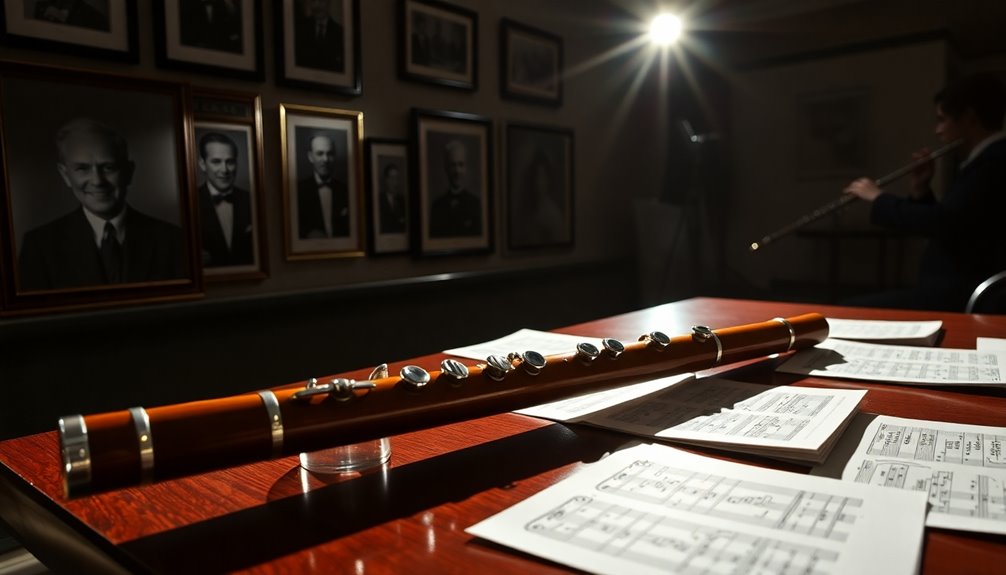
While many flutists today may not realize it, the techniques and philosophies that permeate modern flute playing owe much to the foundations laid by Baker. His approach to teaching emphasized not just technical proficiency but also a deep understanding of musical expression. When you explore the flute repertoire, you'll find that Baker's influence encourages you to connect emotionally with the music, which is essential for compelling performance practice.
Baker's emphasis on sound production and breath control shaped the way flutists approach their instruments. You're likely to notice how his teachings encourage a focus on tonal clarity and dynamic range, allowing you to convey nuanced emotions in your performances. This method has become a cornerstone of modern flute pedagogy, fostering a sense of community among flutists who share these values.
Moreover, Baker's insistence on the importance of chamber music and collaboration is still felt today. When you play with others, whether in a duet or an ensemble, you're engaging in a tradition he championed. This collaborative spirit not only enhances your skills but also nurtures a sense of belonging within the flute community. Additionally, the practice of scales and arpeggios is vital in developing the technical skills necessary for effective collaboration.
In essence, Julius Baker's legacy is woven into the very fabric of contemporary flute playing. His contributions extend beyond mere technique; they inspire you to embrace the art of performance with passion and understanding, making your musical journey not just about personal achievement but also about connection with others through the universal language of music.
Continuing Impact Today
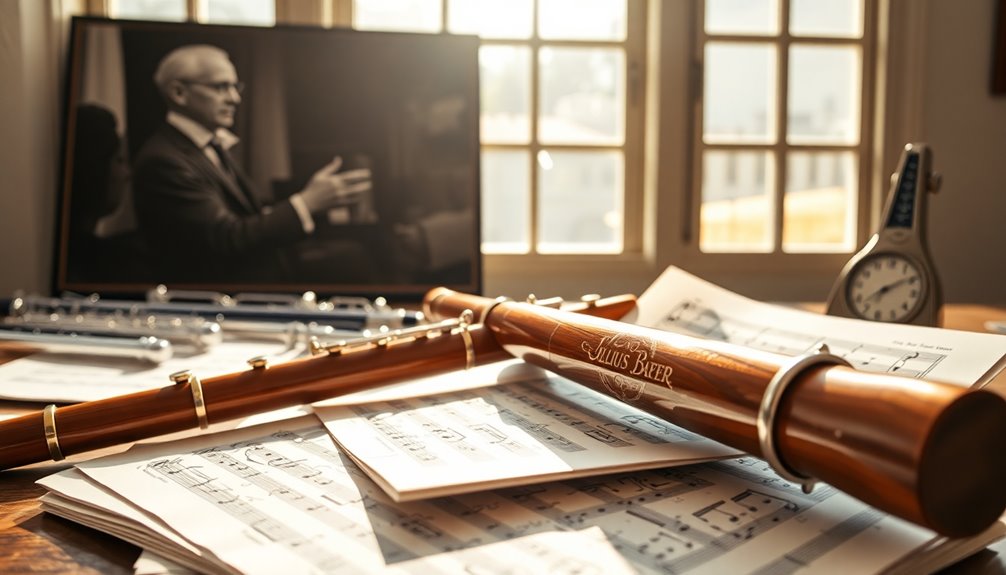
Baker's influence resonates powerfully in today's flute community, shaping not only individual players but also educational institutions and performance ensembles. His legacy is evident in the countless flutists who've adopted his methodologies, creating a strong foundation for their musical journeys.
You might notice his impact in various ways, particularly through the rise of flute competitions and teaching workshops that echo his principles.
1. Flute Competitions: Many prestigious competitions now emphasize the techniques and interpretations promoted by Baker. These events encourage aspiring flutists to integrate his teachings into their performances, fostering a culture of excellence and artistic expression.
2. Teaching Workshops: Numerous workshops dedicated to flute pedagogy draw inspiration from Baker's instructional style. Educators focus on his holistic approach, emphasizing not just technical skills but also the emotional and musical aspects of performance.
Attending these workshops can deepen your connection to the flute community, providing invaluable insights that resonate with Baker's philosophy. Additionally, many of these workshops feature structured learning environments that reflect Baker's emphasis on clear, methodical instruction, further enhancing the educational experience.
3. Institutional Curricula: Music programs across the country have incorporated Baker's methods into their curricula. Students benefit from a structured learning environment that emphasizes the principles he championed, creating a solid foundation for their future endeavors.
Frequently Asked Questions
What Specific Exercises Did Julius Baker Recommend for Developing Tone?
To develop your tone, focus on specific tone exercises that enhance breath control. Start with long tones, holding each note steady while gradually increasing the volume.
Next, practice interval exercises to refine your pitch accuracy. Incorporate dynamic variations to explore your range.
How Did Baker's Teachings Differ From Other Flute Instructors?
Baker's teachings stand out due to his unique methodology and pedagogical philosophy.
While many instructors focus solely on technical skills, you'll find Baker emphasizes a holistic approach, integrating emotional expression and musicality.
He encourages you to explore your sound deeply, fostering a sense of belonging in the music community.
This method not only cultivates strong technical ability but also inspires creativity, allowing you to connect with your audience on a profound level.
Did Julius Baker Compose Any Original Works for Flute?
Julius Baker didn't compose many original works for flute, focusing instead on teaching and mentoring.
However, Baker's compositions reflect his innovative spirit and deep understanding of the instrument.
If you explore his limited original flute pieces, you'll find inspiration in their elegance and clarity.
What Was Baker's Approach to Teaching Group Lessons?
Imagine a room filled with flutes, their notes weaving together like a tapestry.
Baker's teaching philosophy embraced group dynamics, fostering collaboration among students. He encouraged you to listen, to harmonize, and to grow together, creating a supportive atmosphere where each voice mattered.
This method not only enhanced individual skills but also built a sense of belonging, inspiring students to connect with one another while discovering their own musical identity.
How Did Baker Influence Flute Competitions and Auditions?
Baker considerably shaped flute competitions and audition techniques by emphasizing a holistic approach.
You'll notice his influence in the way musicians prepare, focusing not just on technical skill but also on musicality and expression. His students often excelled in competitive environments, embodying confidence and stage presence.
Conclusion
In the grand tapestry of music education, Julius Baker's legacy weaves a vibrant thread that continues to inspire flutists today. His innovative techniques and passionate teaching philosophy not only shaped the careers of countless musicians but also transformed the landscape of flute pedagogy. As you explore his teachings, remember that every note you play carries a piece of his vision, reminding us that the art of music is a living dialogue between past and present.

